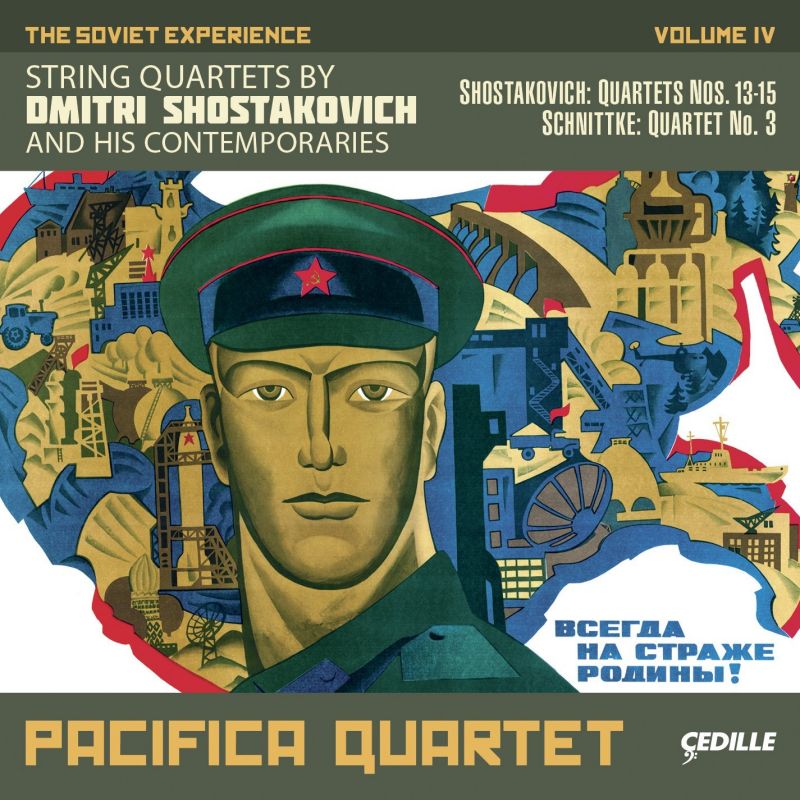SHOSTAKOVICH String Quartets Nos 13-15 SCHNITTKE String Quartet No 3
View record and artist detailsRecord and Artist Details
Composer or Director: Alfred Schnittke, Dmitri Shostakovich
Genre:
Chamber
Label: Cedille
Magazine Review Date: 03/2014
Media Format: CD or Download
Media Runtime: 104
Mastering:
DDD
Catalogue Number: CDR90000 145

Tracks:
| Composition | Artist Credit |
|---|---|
| String Quartet No. 13 |
Dmitri Shostakovich, Composer
Dmitri Shostakovich, Composer Pacifica Quartet |
| String Quartet No. 14 |
Dmitri Shostakovich, Composer
Dmitri Shostakovich, Composer Pacifica Quartet |
| String Quartet No. 15 |
Dmitri Shostakovich, Composer
Dmitri Shostakovich, Composer Pacifica Quartet |
| String Quartet No. 3 |
Alfred Schnittke, Composer
Alfred Schnittke, Composer Pacifica Quartet |
Author: David Gutman
When the Fitzwilliam Quartet, the first British ensemble to take up the cause, worked with the composer himself on his radical Thirteenth Quartet, the experience left such a mark that the ensemble asked that there be no applause when they played the piece at public concerts. Since then we have had more technically inviolable renderings from the likes of the Emerson Quartet. This one makes a less belligerent impact. Japanese-Norwegian viola player Masumi Per Rostad is warm and clear, even elegant in his many important contributions, the recording itself spectacular only in its sheer naturalness.
It’s a similar story in the Fourteenth. For some this kind of ‘normalisation’ will disappoint, for all that the music never gets bogged down. If, like me, you can’t get the Borodin Quartet out of your head in this repertoire it might be worth remembering that the sumptuous tone, technical perfection and soloistic expressiveness, so well remembered from the group’s second survey (including Nos 14 and 15), are less evident in the more direct and intonationally suspect playing of the Beethoven Quartet, for whom the scores were actually written. In Bloomington you never lose the sense of four musicians playing together for pleasure.
I should mention the exceptionally full booklet-notes from Gerard McBurney. The ‘half-references and allusions’ he finds in the Fifteenth above all may or may not matter, whereas the music of Schnittke is nothing without them – in the case of the Third Quartet we have a meta-dialogue with Lassus and Beethoven as well as Shostakovich himself. The inclusion of carefully chosen Soviet-era makeweights ‘adding variety and perspective to the listening experience’ has been a hallmark of this excellent series and, although Schnittke’s score is not new to the lists, this re-contextualisation proves suitably provocative.
Discover the world's largest classical music catalogue with Presto Music.

Gramophone Digital Club
- Digital Edition
- Digital Archive
- Reviews Database
- Full website access
From £8.75 / month
Subscribe
Gramophone Full Club
- Print Edition
- Digital Edition
- Digital Archive
- Reviews Database
- Full website access
From £11.00 / month
Subscribe
If you are a library, university or other organisation that would be interested in an institutional subscription to Gramophone please click here for further information.




